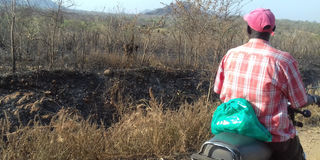Illegal bush fires threaten to strip West Nile land bare

A motorcyclist looks at a section of a burnt bush in Uleppi Sub-county, Madi-Okollo District recently. Bush burning is a common practice in the area every year. PHOTO/FELIX WAROM OKELLO
What you need to know:
- Some of the bush fires have in the process, spilled over and burnt crops and houses.
Every dry season, bush burning is widespread in West Nile sub-region.
Both government and privately owned forests are burnt at will by community members.
Some of the bush fires have in the process, spilled over and burnt crops and houses.
Despite this dangerous practice, the vice goes on unchecked, even when there are ordinances and environmental laws in place to stop the same.
This has seen families that planted trees, counting loses and culprits are rarely brought to book.
Mr John Adiga, 70, and a resident of Madi-Okollo, said the practice is usually done by bush meat hunters during dry seasons, who claim the act is aimed at clearing the bushes so they can see the wild animals from a distance.
He said pastoralists also burn the bush to facilitate the growth of fresh and new grass for their animals when the rains return.
“Indiscriminate burning is affecting us and what is more painful is that these activities are done at night by people with evil hearts. Many farmers here lose their crops to such fires and this affects our livelihood,” Mr Adiga told Daily Monitor on Tuesday.
Ms Joyce Adania, a resident of Offaka Sub-county in Madi-Okollo District, said children also burn grass just for fun as they go to the river to bath or when going to hunt wild birds.
“These children move with matchboxes in their pockets. And normally, children keep on counting days when the dry season starts in December so that they can be able set bushes on fire. The local leaders should do more sensitisation on this because just last week, crops in my garden were burnt in the same way,” she said.
She added: “The bush burning also affects the electricity supply because the poles also get burnt in the process. Two weeks ago, West Nile Rural Electrification company cut off power supply as some of their electricity poles were burnt in the areas of Madi-Okollo District due to wild fires.”
Hunting wild animals is very common in Madi-Okollo, Arua, Odravu in Yumbe, Alwi in Nebbi.
Bush burning is rampant in Zombo Nebbi, Arua, Maracha, Koboko, Yumbe, Moyo and Adjumani districts.
Last year, more than 200 acres of food crops such as sorghum, cow-peas, and cassava, sugar cane and banana plantations were destroyed by bush fires in Moyo and Arua districts.
Speaking to Monitor yesterday, Nebbi Municipality environment officer, Mr Emilio Odongo, said: “The practice has devastating effects on both human and physical environment because it affects soil fertility, kills flora and fauna and leads to food insecurity when crops are burnt. Sometimes it leads to loss of lives. People should stop this practice.”
In 2006, about 62 wetlands were destroyed, especially along Nyagak River, Ora, and Namrwodho in Nebbi and Zombo districts respectively due to bush burning.
Experts say the annual bush burning does not only affect the environment but also causes climate change, which has adverse effect on human and animal health, social integration, as well as the economic well-being of the people.
Background
Food and Agricultural Organisation, an agency of the United Nations, has always warned that soon, indiscriminate cutting of trees by saw millers and bush burning, if not checked, could lead to desertification.
Uganda ratified the United Nations Convention to Combat Desertification in June 1997. The convention aims at combating the causes of desertification and land degradation, which include bush burning, overgrazing and high incidences of poverty.




